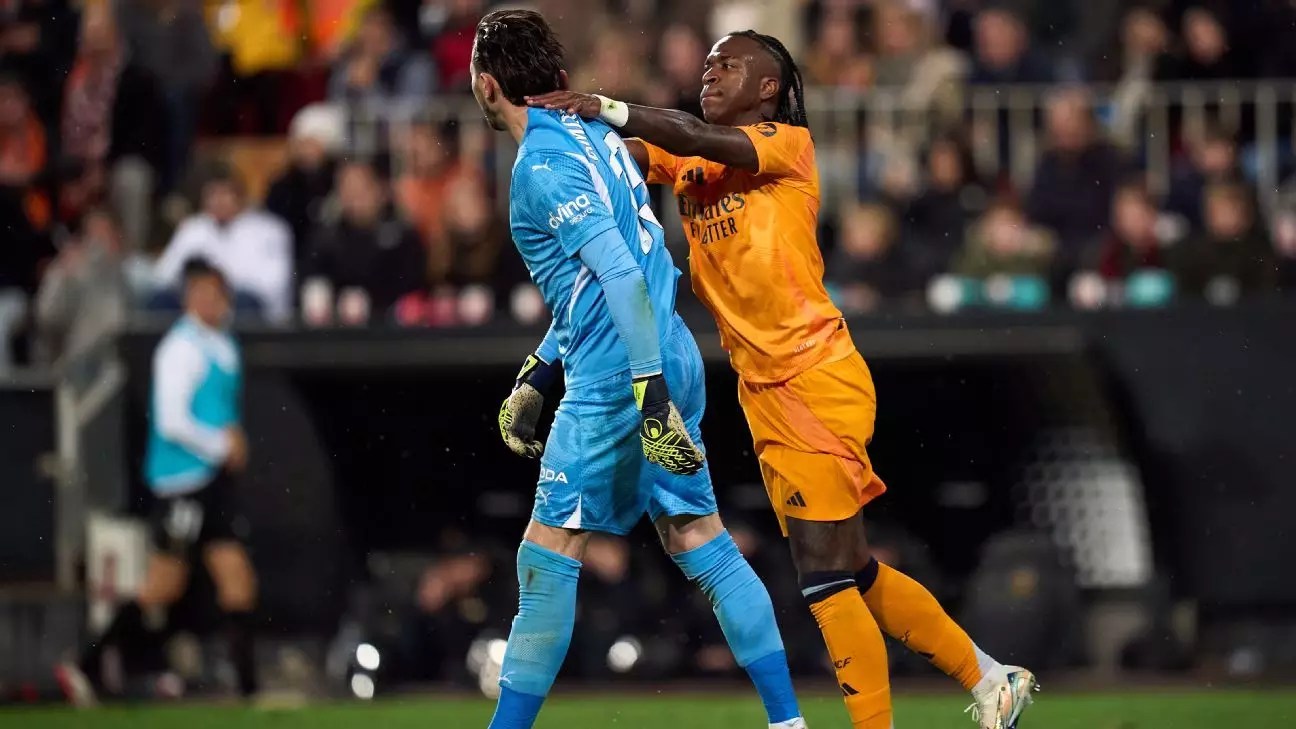In the world of football, a potent mix of talent and controversy can often overshadow individual performances. Recently, Carlo Ancelotti, the head coach of Real Madrid, voiced his strong support for Vinícius Júnior, whose recent two-match suspension raised eyebrows across the sporting community. Vinícius received a red card during a LaLiga match against Valencia after an altercation involving the opposing goalkeeper, Stole Dimitrievski. Although Real Madrid managed to overturn a 1-0 deficit to secure a 2-1 victory, the focus quickly shifted from the team’s resilience to Vinícius’ disciplinary actions.
The Spanish football federation’s disciplinary committee deemed Vinícius’ actions non-aggressive, resulting in a two-game ban instead of a more severe four-match suspension. This decision is significant, as it reflects a growing understanding of the complexities surrounding player conduct, especially regarding how they are treated on the pitch. Ancelotti’s comments in a pre-match press conference underscored his frustration with the media narratives that often revolve around Vinícius provoking opponents rather than addressing the abuse he frequently endures. The Italian coach’s perspective illuminates a broader issue in sports regarding player treatment and the often-lopsided lens through which media and public opinion scrutinize athletes.
Vinícius Júnior’s stellar performance on the field often contrasts sharply with the controversies that surround him. Having recently won FIFA’s The Best award and finishing as a runner-up for the 2024 Ballon d’Or, he has proven his worth as one of the leading figures in contemporary football. Despite his accolades, he has found himself at the center of heated exchanges with opponents, particularly during matches against Valencia, where he has been carded twice—both instances stemming from troubling circumstances, including racial abuse from fans.
His ability to maintain composure under immense pressure is notable, yet it speaks volumes about the systemic issues in football culture. Ancelotti’s assertion that the ban imposed on Vinícius is unjust echoes a sentiment shared by many. It questions the fairness of disciplinary actions in a context where specific players are disproportionately targeted.
As Real Madrid prepares for its upcoming challenge against Mallorca in the Spanish Supercopa, the implications of Vinícius’ absence will be significant. The team’s performance without one of their key players raises questions about their adaptability and strength in depth. Ancelotti’s statement about the team’s confidence in Vinícius also serves as a rallying point, focusing attention on the collective spirit rather than individual missteps.
Moreover, the team’s management is reportedly eyeing potential transfers this January, with links to Trent Alexander-Arnold from Liverpool. Such rumors hint at underlying strategies concerning squad depth and positioning. However, captain Lucas Vázquez’s dismissal of transfer inquiries leads to a broader discussion on team cohesion versus individual talent acquisitions.
The narrative surrounding Vinícius Júnior is a microcosm of larger conversations about player rights, media scrutiny, and institutional biases within football. Ancelotti’s staunch support bolsters the notion that amidst talent and accolades, athletes like Vinícius face problematic scrutiny that can overshadow their accomplishments. As Real Madrid navigates the complexities of player discipline, public perception, and the quest for trophies, the question of fairness and equality within the beautiful game remains crucial. The upcoming matches will not only test the team’s fortitude but also highlight the ongoing battle against tolerance and respect within sports.


Leave a Reply